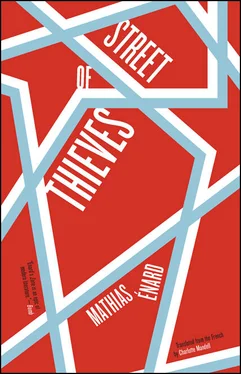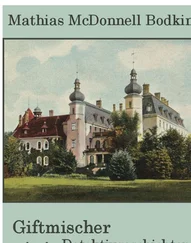By day, whoring was present, but somewhat limited; by night in the high season, dead-drunk foreign tourists got lost in our alleys and sometimes let themselves be tempted by a pretty black chick they’d take from behind, in a doorway, out in the open: I often saw, late at night, the moving shimmer of white buttocks breaking through the penumbra of corner spaces.
Our building was at the start of the Street of Thieves, at its narrowest part, close to Hospital Street; it was a typical neighborhood building, old, ruined; one of those that, despite the efforts of the owners and the city hall, seemed to resist any renovation: the steps in the stairway had lost half their tiles, the woodwork was warped, the walls were ridding themselves of their coating in large sections whose debris littered the landings; electric wires hung from the ceiling, the old ceramic sockets hadn’t seen the nose of a light bulb for ages, and the rusty, dented mailboxes gaped apart, disjointed or wide open, when they still had a door. The stairway was peopled with cockroaches and rats and it wasn’t rare, climbing upstairs at night, to surprise a fat black rodent sucking at the needle of an abandoned syringe, to extract the little drop of blood — the creature would skitter away through a hole in the wall of an apartment, and you’d always shiver, thinking the same thing could happen on our floor.
The drug addicts came from the social aid center that was reserved for them a little farther down the street, and they’d look for a place to shoot up; in adjacent streets, a lot of them resold the methadone the municipality gave them. They entered buildings whose doors didn’t close properly, climbed up as far as their physical condition allowed them, sometimes to the roof, where they didn’t risk being chased out by the occupant with kicks or a broom handle. You felt sorry for them. Most of them were wrecks of stupefying thinness; they had abscesses on their arms, pustules on their faces; a lot of them spoke to themselves, cursed, swore, crushed their cans of beer, which they emptied one after the other, waiting for better; sometimes you saw them staggering, silent, blissful, emerging from a building, and you knew they had just injected themselves, in a hurry, sitting in the midst of roaches, with their dose of happiness. When they had money, they’d buy themselves a bowl of soup at the Moroccan restaurant a little farther down the street, and would stay there a long time, watching TV, looking absent; the restaurant owners were generous, they tolerated these phantoms who paid and stole nothing but teaspoons — they just didn’t let them use the bathrooms. The drug addicts even had a little park to themselves, a corner of greenery that no one denied them, not even City Hall: a little more to the south, near the harbor, against the ramparts of the Gothic Arsenal, behind an embankment that must once have protected an old moat, there was, two meters down, a square of grass invisible from the street — agents of municipal cleanliness didn’t often go down there, and even the cops, on the principle that anything invisible isn’t annoying and thus does not exist, only rarely bothered the junkies. There were women and men, even though it was sometimes hard to tell what sex they were; they lived among themselves, argued among themselves, died among themselves, and if they weren’t the most elegant or the cleanest inhabitants of the neighborhood, they were, along with the rodents and insects, among the most harmless.
Except sometimes, just as a dog at bay can show its teeth and try to bite an aggressor, you saw some of them turn violent; I remember an incredible fit of madness, one day, when I was on my balcony calmly observing the goings-on in the street, one of those guys emerged from his methadone stupor in a rage; he began shouting, then screaming incomprehensible curses, hitting his fist against the wall, then against a passing Pakistani who didn’t understand what earned him this deluge of bruises; two people came to his aid: despite his skinniness, the addict had immense, almost divine strength, three young men couldn’t manage to control him but just tear him away, trying to grab him around the waist, his clothes were much less resistant than he — first his T-shirt tore, then his belt gave out, he fought like a demon and sent his aggressors rolling with huge vengeful kicks in the shins, the balls, until he was just in his underwear, he fought in his underwear like a ridiculous warrior, thin and meager, his legs covered with sores, his arms crusted with scabs and tattoos, and it took five people, two cops, and an ambulance to bring it to an end: the fuzz managed to handcuff him, the men in white gave him an injection and then strapped him to a stretcher to take him God knows where — there was a real sad beauty in this last battle of the poor naked man, dispossessed of his brain and his body by heroin; he was fighting against himself, against God, and the social services, which to him were identical.
The whores also provoked pity, but of another kind. Some were nasty pieces of work, sharp, dangerous she-wolves who didn’t think twice about robbing customers or scratching the eyes out of a bad payer; they showered insults on males who refused their advances, calling them homos, fairies, impotents. Most of the women came from Africa, but there were also a few Romanians and even one or two Spaniards, including the one sitting under a porch at the entrance to the street, Maria, something of a concierge for our palace. Maria was in her forties, somewhat plump, usually smiling, not very pretty, but nice; she sat there in front of her door every afternoon and evening; she would spread her legs and show us her thong, calling us her little darlings when we walked by her: I would always politely reply, hello Maria, quickly checking out her cunt, it did no harm to anyone, it was good neighborliness. I never dared go up with her — because of the age difference, first of all, which intimidated me, and because of the memory of Zahra, the little whore in Tangier, which saddened me. Most of the regular customers were immigrants, broke foreigners who haggled over the price, which made Maria shout: she’d spit on the ground, screaming like a pig, Then go see the black girls, at that price! The sex business was in mid-crisis, too, apparently. Maria lived with a guy who was a truck driver, or a sailor, I forget — in any case he wasn’t there much. The African girls had pimps, mafiosi to whom they had sold their bodies in their native countries, for the price of the crossing to Europe: I don’t know how long they had to get laid by the poor and the tourists before they could get their freedom back — if they ever did.
There was also a bicycle repair shop, a poultry dealer, some illegal fridges for the beer-selling Pakistanis, some storehouses for roses for the rose-selling Pakistanis, some poor Moroccan families, some poor Bengali families, some old Spanish ladies (who had known the neighborhood since before the war and who said that, aside from the nationality of the whores and thieves, few things had changed), and some young illegal immigrants like us, mostly Moroccan, some of them underage, kids hanging around waiting for a low trick to dispel their boredom as much as to make themselves a little dough: rob tourists, sell them fake hash, nick a bicycle.
And just at the corner, a mosque, the Mosque of Tariq ibn Ziyad, glorious Conqueror of Andalusia, which was why I had ended up in the neighborhood: it was the only one Judit knew, one of the oldest in Barcelona, situated on the ground floor of a renovated building. It was clean and quite large.
There were also two booksellers not far away, a big underground supermarket nearby, and a used-book market every Sunday within walking distance, so I was content. Sad, my heart broken by Judit, but content.
Читать дальше












